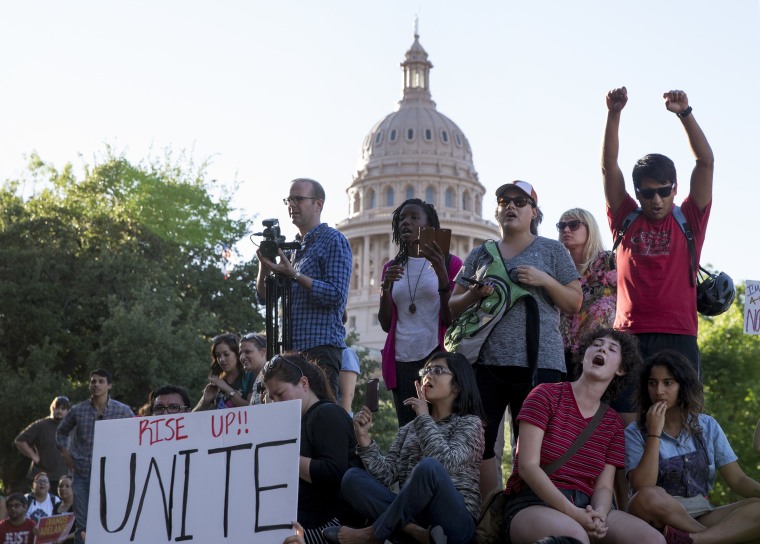The state of Texas has passed a law that has been described as a ban on "sanctuary" cities, but there is much more to the law that doesn't get captured by that term.
Opponents say it not only puts immigrants in the cross hairs of law enforcement, but also U.S. citizens, legal residents, public officials and law enforcement officers. The law’s supporters say it is designed to boost public safety by enforcing laws already in place.
The Texas law, which goes into effect in September, follows one passed in Arizona that also tried to use local and state law enforcement to question the immigration status of residents. The Supreme Court gutted the Arizona law and a settlement removed a "show me your papers" provision requiring officers to investigate a person's immigration status if they had "reasonable suspicion" the person was illegally in the U.S.
The legal fight over the law has already begun, so here are five things to know about the law:
It's not just police who will enforce immigration
The law enlists city council members, members of county commissions or other local governing bodies, sheriffs, district and city attorneys and even police on the campuses of colleges and universities in the effort. It prohibits them from adopting any policy to prohibit or "materially limit" a corrections officer, commissioned peace officer, booking clerk, magistrate, district attorney, criminal district attorney or other prosecuting attorney from checking into a person’s immigration status and reporting that information to the feds or another local entity.
Government officials or campus police in those positions also can’t stand in the way of federal immigration officers enforcing immigration laws at a local jail.
Officials can be removed for not complying with the law
Some officials have said the law doesn't mandate that local entities investigate a person’s immigration status, but it permits it.
But the law allows state officials to remove from office any elected or appointed official who prohibits or “materially limits” enforcement or cooperation with immigration federal officials. Uncooperative sheriff, police chief, constable or jail administrators could face Class A misdemeanor charges. Defiance could mean fines of between $1,000 to $1,500 for the first violation and $25,000 to $25,500 for each one after that.
Thomas Saenz, president and general counsel for the Mexican American Legal Defense and Educational Fund (MALDEF) said the state is treading precarious ground with those provisions. He argues a local official who voices disagreement with the provision could be seen as obstructing police officers from immigration enforcement. The provision may not stand up against First Amendment protections, he said.
But Texas Governor Greg Abbott said the law has "already been tested at the United States Supreme Court and approved there."
It encourages people to turn in their local government or university officials
The state’s cops, sheriffs and government officials may have to keep looking over their shoulder. Employees of the local governments or colleges and universities can turn in any employer who is not following the law. Then, the attorney general can order compliance or take the entity to court.
Victims and witnesses could be asked about their immigration status
There are protections for crime victims or witnesses from being questioned about immigration status. But the law also provides some exemptions.
Officers can ask the victim or witness about their nationality or immigration status if the officer has “probable cause” to believe the victim or witness committed another crime. (Entering the country without inspection is a misdemeanor, so that would constitute as a crime).
It promises to defend those who are sued for complying with the law
The law says the state attorney general will defend anyone who is sued for complying with the law. The governor says it's about public safety.
“This bill will help keep dangerous criminals off our streets and protect innocent lives. For every ounce of criticism, there is a pound of praise from Texans who simply want laws to keep them safe,” stated a spokesperson for Abbott.
Civil rights organizations like MALDEF say there is no question there will be litigation. They say public officials and law officers that honor detainers are certain to face Fourth Amendment legal challenges because there often isn't sufficient cause for local officials to hold someone in detention beyond a release date. There also are certain to be civil rights and racial profiling accusations.
Texas taxpayers will be footing state costs for defending the law and its enforcers.
“It’s an open checkbook and there are going to be lots of suits,” said Saenz. “Why a fiscally conservative governor and legislature would write a check like that is the untold story.”

